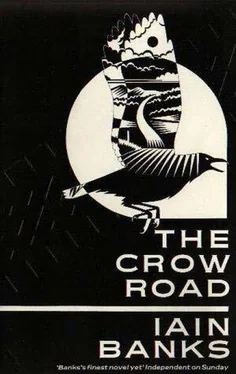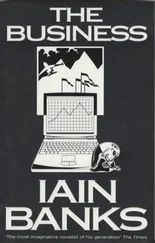Iain Banks - The Crow Road
Здесь есть возможность читать онлайн «Iain Banks - The Crow Road» весь текст электронной книги совершенно бесплатно (целиком полную версию без сокращений). В некоторых случаях можно слушать аудио, скачать через торрент в формате fb2 и присутствует краткое содержание. Год выпуска: 1992, Жанр: Современная проза, на английском языке. Описание произведения, (предисловие) а так же отзывы посетителей доступны на портале библиотеки ЛибКат.
- Название:The Crow Road
- Автор:
- Жанр:
- Год:1992
- ISBN:нет данных
- Рейтинг книги:5 / 5. Голосов: 1
-
Избранное:Добавить в избранное
- Отзывы:
-
Ваша оценка:
- 100
- 1
- 2
- 3
- 4
- 5
The Crow Road: краткое содержание, описание и аннотация
Предлагаем к чтению аннотацию, описание, краткое содержание или предисловие (зависит от того, что написал сам автор книги «The Crow Road»). Если вы не нашли необходимую информацию о книге — напишите в комментариях, мы постараемся отыскать её.
The Crow Road — читать онлайн бесплатно полную книгу (весь текст) целиком
Ниже представлен текст книги, разбитый по страницам. Система сохранения места последней прочитанной страницы, позволяет с удобством читать онлайн бесплатно книгу «The Crow Road», без необходимости каждый раз заново искать на чём Вы остановились. Поставьте закладку, и сможете в любой момент перейти на страницу, на которой закончили чтение.
Интервал:
Закладка:
I nodded and smiled at him. "Oh well," I said. The door opened and I got out of the way of Aunt Tone, bearing pills and a glass of water. "See you tomorrow, Prentice," she whispered to me. She patted my arm. "Thank you."
"It's all right. See you tomorrow, Aunt Tone."
Outside, on the landing, I looked down the stairs to where my mother was standing by the front door, putting on her jacket. I leant back against the closed bedroom door for just a second, and — looking at nothing in particular — said very quietly to myself, "See?"
I went to the land-side edge of the concrete cube, and faced back at the remains of the sunset, trying to work out how I was going to feel seeing Lewis and Verity again, after the way I'd behaved at New Year. But search as I tried, I could find no trace of dread or jealousy; I was even looking forward to seeing them again. Something of the coldness that had settled over me in the last few days seemed to have spread to the way I felt about Verity. It felt like all my jealous passion had dissipated like the clouds overhead.
I thought about jumping down onto the beach, but that might have been asking for another family tragedy, so I climbed down, walked to the end of the shallow scoop of bay and set off through the grass by the side of the burn, heading back to Gallanach through the calm summer gloaming.
…He told us about the plants on the islands, too; how the open, glorious machair, between the dunes and the farmed land, was so dizzily sumptuous with flowers because it was the place where the acidic peat and the alkali sands produced a neutral ground where more plants could flourish in the sunlight. And just the names of those plants were a delight, almost a litany; marsh samphire, procumbent pearlwort, sand-spurrey, autumnal hawkbit, cathartic flax, kidney vetch, germander speedwell, hastate orache, sea spleenwort; eyebright.
We learned about the people who had made Scotland their home: the hunter-gatherers of eight or nine thousand years ago, nomads wandering the single great wood and stalking deer, or camping by the edge of the sea and leaving only piles of shells for us to find; the first farmers, just beginning to clear the land of the blanket of thick forest a few millennia later; the neolithic people who had built the tomb of Maes Howe before the pyramids were constructed, and the stone circle at Callanish before Stonehenge, in the thousand-year summer of the third millenium; then came the Bronze Age and Iron Age people, the Vikings and Picts, Romans and Celts and Scots and Angles and Saxons who had all found their way to this oceanically marginal little corner of northern Europe, and left on the place their own marks; the treeless slopes themselves, the roads and walls, cairns and forts, tombs, standing stones, souterrains, crannogs and farms and houses and churches; and the oil refineries, nuclear power stations and missile ranges, too.
He made up stories, about the secret mountain, and the sand-drowned forest, the flood that turned to wood, the zombie peat, and the stone-beings that drilled for air. Sometimes the location for, or the subject of, a story would have some basis in fact; the secret mountain was a real hill on which grew a flower that grew nowhere else in the world. There had indeed been great storms that had moved whole ranges of sand dunes inland, drowning forests, and villages… And peat was un-dead, the surrounding rocks" acidity, the chill Atlantic airs and ever-likely rain conspiring to prevent the corpses of the dead plants from decomposing.
Other stories were pure fantasy, the result of a kind of child-like quality in him, I think. If you looked at certain stands of trees from a distance, especially in a glen, and when in full leaf, they did look like great bulging torrents of green water, bursting from the depths of the earth and somehow frozen. There was a sort of visual naivety at work there that verged on the hallucinogenic, but it did, I'd argue, make a warped sort of visual sense. Magmites — the people who lived in the mantle of the earth, beneath the crust, and who were drilling up for air the way we were drilling down for oil — must just have appealed to that part of him that loved turning things around. Opposites and images fascinated him, excited him; magicked inspired absurdity from him.
I think Uncle Rory would have given almost anything to have tapped the lush gravidity of that source as well.
Telling us straight or through his stories, my father taught us that there was, generally, a fire at the core of things, and that change was the only constant, and that we — like everybody else — were both the most important people in the universe, and utterly without significance, depending, and that individuals mattered before their institutions, and that people were people, much the same everywhere, and when they appeared to do things that were stupid or evil, often you hadn't been told the whole story, but that sometimes people did behave badly, usually because some idea had taken hold of them and given them an excuse to regard other people as expendable (or bad), and that was part of who we were too, as a species, and it wasn't always possible to know that you were right and they were wrong, but the important thing was to keep trying to find out, and always to face the truth. Because truth mattered.
I suppose we all want to pass on our beliefs; they seem even more our own than the genes we transmit… but maybe they are largely inherited too, even if sometimes what you inherit is the exact opposite — the reversed image of what was intended.
Sometimes I felt he was trying to brain-wash us; that he wanted us to be images of himself, thinking the way he thought, doing what he would have done, as if that would help him cheat death, make him less mortal somehow. Then all his parables and laws seemed like megalomania, and his reasoned certainties like dogma.
Other times he seemed genuinely altruistic, and on occasion I thought I could sense something like desperation in him, trying so hard to equip us as best he could for the vicissitudes of life, while the world changed all around us so fast that some of his ideas and theories — which had seemed so important to him in his life, and so crucial for us to know in turn — became irrelevant; were proved wrong, or just shown to be not so important after all.
My mother was different, and always had been. I don't think she ever really laid down the law like that, not even once; she just got on with things. We knew we were loved, and we knew when something we'd done was disapproved of, but she trained us by example, and let us make mistakes. The only idea I think she could ever be accused of trying to put into our heads was the welcome realisation that whatever happened to us, she'd be there.
I'm not sure that it wasn't the more effective method in the end, and — in its own way — more confident, too.
Half an hour after I'd left Darren's post-post-modernist concrete block I stood in the dusk light beneath the dun on the hill of Bac Chrom, within sight of the track at last, the lights of Slockavullin village beneath me, the eastern edge of Gallanach a thin grid of orange sparks to my right, the main road to Oban and the north busy with lights of white and orange and red, and the dark landscape below full of soft undulations, littered with chambered cairns, cup and ring marked rocks, standing stones, tumuli and ancient forts.
All the gods are false, I thought. Faith itself is idolatry.
I looked into that ancient, cluttered darkness, wondering.
CHAPTER 14
So anyway, bro, how are things?" Lewis shook his head slowly and deliberately. He held up his whisky glass and studied it from close range, focusing with explicit care, one eye at a time. I formed the impression he was attempting to fix the tumbler's image in his memory so he'd know the identity of the receptacle to blame come the following morning. I was so drunk at the time this actually seemed like quite a smart idea, and I would probably have attempted to do the same thing myself if I'd thought I was remotely capable of coordinating my hand, eyes and brain to that degree. The only reason I could get my drinking hand and my mouth in roughly the same place at approximately the same time at this stage in the evening was because I'd had so much recent practice at it. And even that comparatively simple system wasn't a hundred per cent any more; I'd missed my mouth twice already and spilled small amounts of whisky onto my chin and shirt. I'd carried it off with dignity, though.
Читать дальшеИнтервал:
Закладка:
Похожие книги на «The Crow Road»
Представляем Вашему вниманию похожие книги на «The Crow Road» списком для выбора. Мы отобрали схожую по названию и смыслу литературу в надежде предоставить читателям больше вариантов отыскать новые, интересные, ещё непрочитанные произведения.
Обсуждение, отзывы о книге «The Crow Road» и просто собственные мнения читателей. Оставьте ваши комментарии, напишите, что Вы думаете о произведении, его смысле или главных героях. Укажите что конкретно понравилось, а что нет, и почему Вы так считаете.












